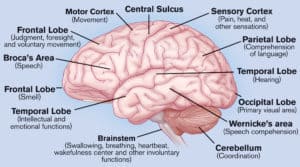Is the mind different than the brain? In one form or the other, the mind-body question has been debated since ancient times.
If you are a strict materialist, the use of the word “mind” as a label for the results of physiological brain functioning may seem wrong, but Mental Construction argues there’s a useful distinction between brain and mind. The mind works on a construction of shared reality which is significantly shaped by partially viewed personal occurrences, individual genetic imperatives, and idiosyncratic neural properties. The internal worldview I have (in my mind) is distinct from the external world that another observes, because my internal worldview includes my past which my brain uses to shape my present understanding.
The brain receives raw data from external reality. The mind works with the internal worldview, which is never as detailed as the external world.
Let’s use “brain” for the physical substance in your head and “mind” for the non-physical contents (imparted by structure of the brain’s neural network) of your thoughts. However, this does not imply that I’m a dualist, asserting that brain and mind exist in separate realms. A path can be laid from the physical to the mental. Although we can’t ignore that, the Almost Gate of the neural threshold blocks the brain and the mind from being identical twins.
It is essential to consider the complex path between external physical reality and internal reality. We build, from what we observe and what we know, a worldview upon which we make decisions, act, and form plans.
Our apprehension of sense data is not a causal process. The same external situation can affect you differently next year than it does today. How? If your internal worldview changes, then the same external situation is understood differently.
Memories are also constructed rather than recalled from static detail. Memories meld our current worldview with our memory fragments. This is yet another reason to use the term “mind,” as memories exist in the mind, not in the brain.
It is useful to get the nomenclature right to lead the discussion down a fruitful path. To that end, the internal perception of reality will often be labeled as “mental” rather than “brain function.” This emphasizes the imprecise relationship between external and internal reality, which is an essential element of everyone’s distinct view of reality.


